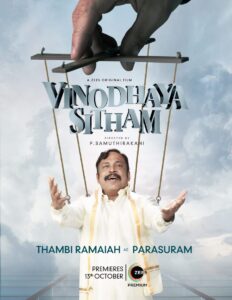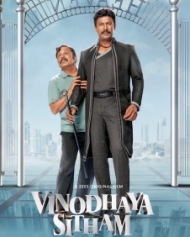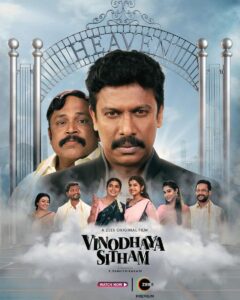Vinodhaya Sitham Tamil Movie Review
Cast-;
Samuthirakani , Thambi Ramaiah , Munishkanth Ramdas , Sriranjani , Sanchita Shetty , Jayaprakash , Balaji Mohan , Deepak , Namo Narayanan , Teejay Arunachalam , Sheriina Mahalakshmi , Hari Krishnan, etc.
Crew-;
Music – C Sathya , Director – Samuthirakani , Producer – Abirami Ramanathan , Cinematographer – N. K. Ekambaram , Released – ZEE5 Original O T T Platform , P R O – Riaz K Ahmed , Singaravelu , Diamond Babu , Mounamravi and
V4U MEDIA etc.
Story-;
Parasuraman and Eswari are married, and they have three children, a son and two daughters. Parasuraman is working in a reputed company and is expecting the promotion as a General Manager. Arun, his son, is working in the US, and his youngest daughter, Gayathri, is in her college. Veena is his eldest daughter, and Parasuraman has planned to get her married to his friend Kicha’s son. Unexpectedly in an accident, he is killed. He meets the Time and asks him to give him a few years of life, and he has a lot of pending works. As he pleads, the Time gives him 90 days. What happens in that 90 days? The rest of the story deals with that!
Watch The Trailor-;
Movie Review-;
In Bruce Almighty, God meets a regular person and gives him superpowers. In the Akshay Kumar-starrer Oh My God!, he reforms an atheist into a theist. In Vinodhaya Sitham, Samuthirakani tweaks this template to his style of films that are usually packed with edifying messages. The message in this film is that we won’t find peace until we recognize the insignificance of our egos. It’s conveyed through the story of Parasuraman (Thambi Ramaiah), a middle-aged executive obsessed with career, wealth and social status. At home, he’s a benevolent despot with his wife, son and two daughters, thinking of them more as his satellites than as people capable of thinking for th emselves. If God wanted to teach such a person a lesson, it would look like Vinodhaya Sitham. Except that, God, played by Samuthirakani, is called Time in this film. Early on, Parasuraman meets with an accident and dies. In a space that looks like a black void, he meets Time (a form of God responsible for the causality in our lives, ensuri ng that we reap exactly what we had sown).
Through this conversation, the philosophical premise of the film is established when Time says to Parasuraman: all events in our lives are predestined by God based on our past actions; our desires and efforts are irrelevant. Th at sounds like a tough idea to sell. But you accept it as the truth within this film’s universe (even if you might not personally buy into it) because this conversation is happening after Parasuraman’s death: unlike the living, a dea d man would, perhaps, be a bit more willing to accept that his ego is insignificant.After their first meeting, Para suraman gets to come back to earth for three months to complete his final duties (and also to enjoy his long-pen d ing desires) on one condition: Time will shadow him everywhere. This sets it up for a common mythological tro pe, much like, say, the Biblical book of Job, where an essentially good man is put through a series of terrible misf ortunes until he realizes that the best attitude is to accept everything as God’s blessing, good or bad.
In Vinodhayam Sitham, Parasuraman gradually loses everything he has, his job, his family, social status, only to gain even better replacements. It teaches him that what life gives us is often better (and morally appropriate) th an what we desire from it.After he is raised from the dead, Parasuraman is forced to quit his job when he’s deni ed a promotion he feels he deserves. Next, his wife is diagnosed with Parkinson’s and hospitalized. By the time we get to episodes where his eldest daughter elopes with her boyfriend against Parasuraman’s wishes and his son reveals to him that he’s already been living with his girlfriend, things get predictable. The film lingers a little too long on the idea that a person who has everything in the world could lose it all in a second, and it repeats si milar episodes to establish an already common notion. Every episode follows a similar pattern: Parasuraman throws a tantrum when something unpleasant happens, and Time forces him to see every event as a just refle ction of some action of his from the past.
The film is weakest when it tries to explain Parasuraman’s present through his past. Out of nowhere we get stor ies about how he trifled with a girl’s heart in his youth, cheated an interview candidate in order to get his pr ese nt job, and how the daughter who eloped is the same one he had tried to abort when his wife was pregnant. The se flashbacks from his life feel like convenient devices to drive home a moral point about, say, why abortion is bad (according to Time). But it’s not like Parasuraman’s daughter eloped because he tried to abort her as a fo et us. Linking the two events is a false explanation for Parasuraman’s problems. Parasuram (Thambi Ramaiah) is the sole breadwinner of the family. He has many responsibilities to fulfil, and is sure that his promotion to the G M of the company would settle them. Unfortunately, on his way to the meeting, he has an accident. What hap pe ns to Parasuram’s dreams? Did he get a second chance? How his story ends is Vinodhaya Sitham’s core premise. The ro le of Parasuram is tailor-made for Thambi Ramaiah.
It is a mix of innocence, attitude and emotion that comes naturally to him. It is no surprise that he pulls it off with ease and manages to make it compelling. From high pitch anger to soft glimmer eyes, Thambi Ramaiah makes the best use of his natural abilities. It also helps him that the character offers him enough scope to make them count. Barring some over the top moments (which are intentional), everything else is alright.Samuthirakani is now fam ous as an actor, but he is also a director by profession. He had directed the Telugu remake of Nadodigal (Shambo Shiva Shambo) more than a decade ago itself. Since then, he has been going behind the camera now and then. Vin odhaya Sithram is his latest directorial venture.Samuthirakani as Time brings a certain nonchalance and misch ie vousness to an otherwise dignified character. In contrast to his other serious roles, say Appa, where he gets his own monologues, many of his dialogues here are crisp and epigrammatic. Thambi Ramaiah prevents Parasura man from becoming a caricature. If he hadn’t made the character as relatable, the moral messaging of the film would have seemed pretentious.
Because he gets us to identify, at some level, with the confused and pompous Parasuraman, we are invested in the film’s message. The story of Vinodhaya Sithram is simple. It takes inspiration from Bruce Almighty template, where an external power gives a chance to ordinary man to correct his mistakes or live his life again for a certain period.When it comes to Vinodhaya Sitham, it is time. It is a neatly framed device that helps take the narrative fo rward and push the message of ‘Karma’. It says that an individual should do ‘whatever-it-is to-be-done’ to the be st of his abilities and not bother about the rest.The journey between Thambi Ramaiah and Samuthirakani is the mainstay of the movie. It provides entertainment and message simultaneously. The situations and char acteri sations are explicitly designed to pass on the message. It is where the narrative appears formulaic after a po int. Different aspects of a family and the human psyche are packed in the narrative to drive the relevant message.
At times, the account feels that if the outcome was thought first and then the characters created for it. Despite a short run-time, if there is a formulaic feeling, it is due to the aforementioned factors.Still, there is a feel-good fa ctor running throughout the narrative. The conversations between the two primary characters add to the fun. O ne moves forward only to watch them lead the way.The emotional drama around the climax could have been be tter handled. The idea and intention are good, but the required emotion is not entirely felt. Overall, Vinodhaya Si thram is a harmless little movie that aims to pass on a timeless message. It is about doing our duty with hon e sty and moving on. Give the film a try if you want some feel-good entertainment for a change. But, it is better to ha ve expectations under check.Samuthirakani is perfect in the critical supporting part.
He carries it with grace, poise and control without ever going overboard. Sriranjani is adequate as the caring and doting mother. Jayaprakash and Muniskanth add to the variety and deliver the required. Others like Deepak, Sa nchita Shetty, Yuva Latchmi and Sherin etc., do their small but emotional parts well.The background score by C Sathya is good. It helps in adding a feel-good atmosphere. The cinematography by NK Ekhambaram could have been better. The editing by AL Ramesh is neat. There is a smooth flow in the narrative. Sreevathsan, Viji and Sa muthirakani are jointly credited for dialogues where are okay.But apart from sacrificing believability to make moral points, Vinodhaya Sitham mostly works as a comedy-drama. Like Samuthirakani’s earlier Nadodigal, most of the messaging emerges organically from the drama, with little exposition. Right at the end is a superb quip by Time about heaven and hell, and it leaves you thinking about the film’s message, even if the film that served as its vehicle isn’t as memorable.
This IS MY Personal Review So Please Go And Watch The Movie In ZEE5 Original O T T Platform
Written By- T.H.PRASAD -B4U-Ratting-3 /5

















